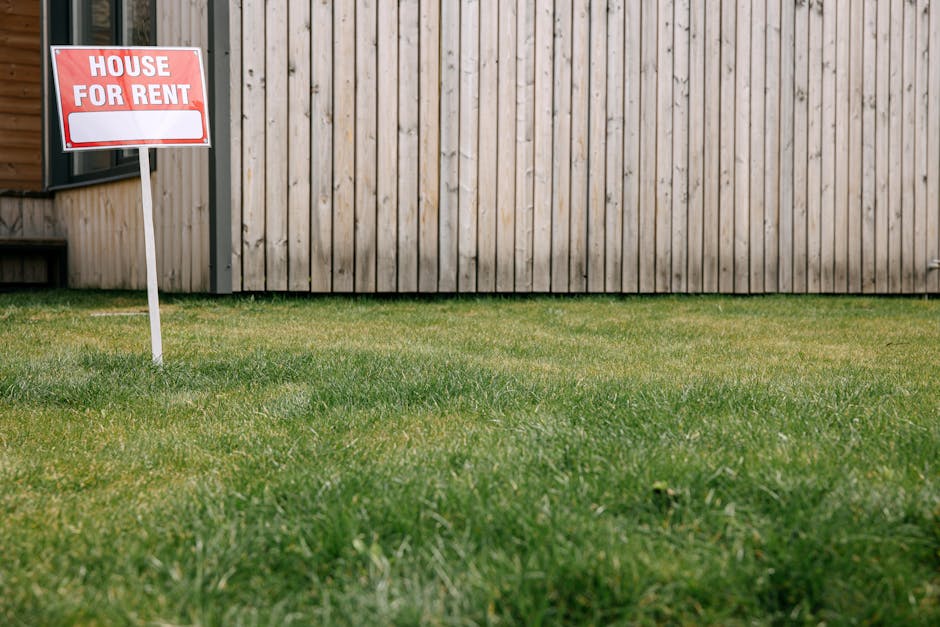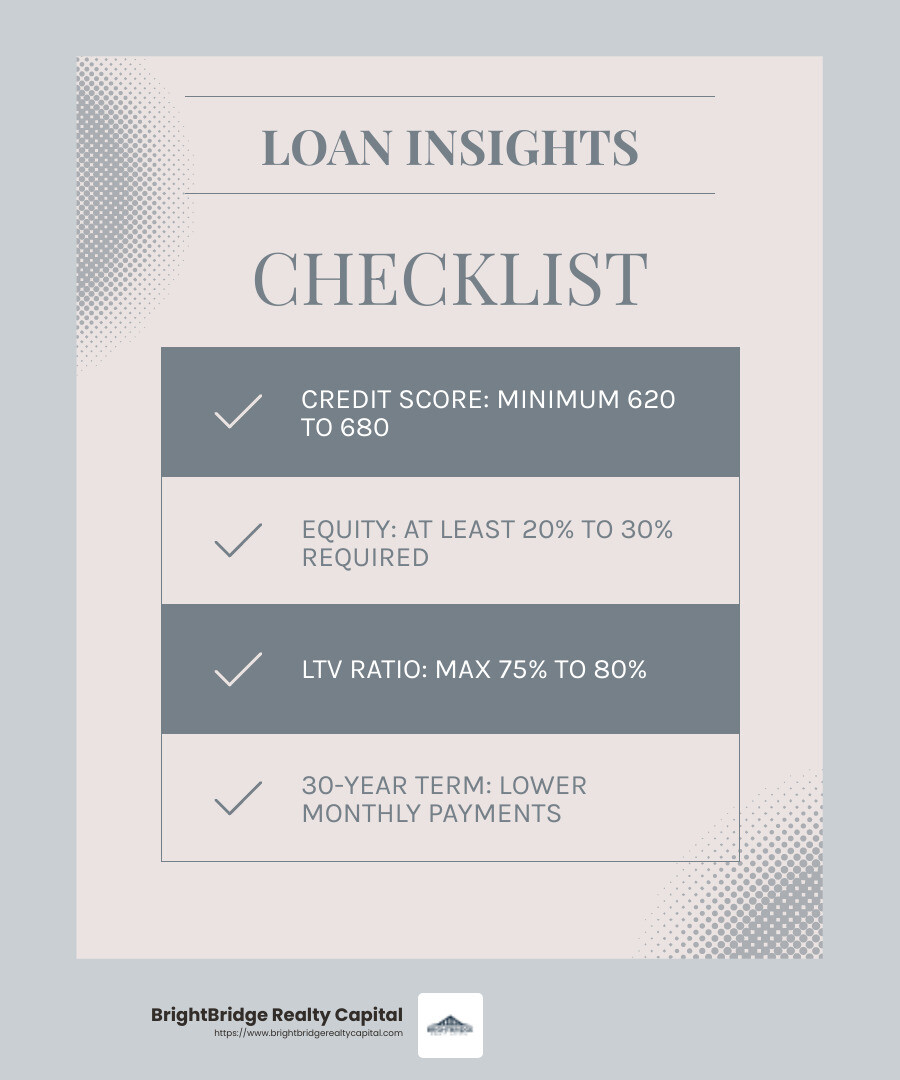The 30-Year Cash-Out Refi: A How-To for Rental Properties

Rental property cash out refi 30 year conforming loan is a powerful tool for real estate investors looking to leverage their property's value for further opportunities. By refinancing your rental property with a 30-year conforming loan, you can open up capital, improve your investment portfolio, and secure more attractive financing terms.
At a glance:
- Overview: Open up the equity in your rental property with a 30-year conforming loan.
- Benefits: Access cash for renovations, expansions, or debt consolidation at potentially lower interest rates. Spread out payments over a longer period for reduced monthly obligations.
- Investment Strategy: Reinvest the funds into new properties, improve your existing assets, or implement new financial strategies to maximize returns.
This strategy enables savvy investors to streamline their debt, manage cash flow more effectively, and capitalize on emerging market opportunities. With favorable interest rates and the potential for improved cash flow, cash-out refinancing on a 30-year term can provide the flexibility needed to steer market changes and secure long-term growth.

Rental property cash out refi 30 year conforming loan terms simplified:
Understanding Rental Property Cash-Out Refi 30-Year Conforming Loan
Eligibility Requirements
Before diving into a rental property cash-out refi 30-year conforming loan, it's crucial to understand the eligibility requirements. This type of loan is governed by the guidelines set by Freddie Mac and Fannie Mae, two entities that help standardize mortgage lending in the U.S.
Credit Score: Typically, lenders require a minimum credit score of 620 to 680. Some may demand even higher scores, especially for investment properties. A strong credit score not only helps with eligibility but also secures better interest rates.
Equity: You must have sufficient equity in your property to qualify. Lenders generally expect at least 20% to 30% equity. Equity is the difference between your property's market value and the outstanding mortgage balance.
Loan-to-Value (LTV) Ratio: The LTV ratio is a key factor. For a cash-out refinance, the maximum LTV ratio is often between 75% and 80%. This means you can refinance up to 75% to 80% of your property's appraised value.
Loan Terms and Conditions
Interest Rates: Interest rates for a 30-year conforming loan are typically lower than those for non-conforming loans. This is because conforming loans meet the criteria set by Freddie Mac and Fannie Mae, making them less risky for lenders.
Loan Duration: A 30-year term spreads out your mortgage payments over a longer period, reducing monthly obligations. This can improve cash flow, allowing you to reinvest in your property or other ventures.
Monthly Payments: With a 30-year loan, your monthly payments are generally lower compared to shorter-term loans. However, be aware that spreading payments over a longer period means you'll pay more in interest over the life of the loan.
By understanding these requirements and conditions, you can better prepare for a cash-out refinance, maximizing the benefits for your rental property investments.

Step-by-Step Guide to Cash-Out Refi for Rental Properties
Determine Your Eligibility
Before you start the process, check if you qualify for a rental property cash-out refi 30-year conforming loan. Here's what you need to consider:
Credit Score: A minimum credit score of 620 is often required, but having a score of 680 or higher can improve your chances and secure better rates. Some lenders might even ask for higher scores, especially for investment properties.
Property Equity: Ensure you have sufficient equity in your property. Typically, you need at least 20% to 30% equity. Calculate this by subtracting your current mortgage balance from your property's market value.
Loan-to-Value Ratio (LTV): Aim for a maximum LTV ratio of 75% to 80%. This means you can refinance up to 75% to 80% of your property's appraised value.
Gather Necessary Documentation
Once you've determined your eligibility, gather the required documents. Having everything ready will make the process smoother and faster:
Income Proof: Collect recent pay stubs, bank statements, or other documents that show your income. This is essential for proving your ability to repay the loan.
Tax Returns: Have your last two years of tax returns on hand. Lenders use these to verify your income and tax obligations.
Rental Agreements: Provide copies of rental agreements for the property. This shows your rental income and confirms the property's use as a rental investment.
Shop for Lenders
Finding the right lender is crucial. Here's how to ensure you get the best deal:
Compare Rates: Don't settle for the first offer. Shop around and compare interest rates from different lenders. A small difference in rates can save you a lot over time.
Evaluate Terms and Fees: Look beyond the rates. Check the terms and any associated fees. Some lenders may offer attractive rates but have high closing costs or other fees.
Consider Lender Reputation: Choose a lender with a good reputation. Read reviews and ask for recommendations to ensure you're working with a reliable partner.
By carefully following these steps, you can steer the cash-out refinance process effectively, maximizing the benefits for your rental property investment.
Pros and Cons of Cash-Out Refinancing
When considering a rental property cash-out refi 30-year conforming loan, it's crucial to weigh the pros and cons. This decision can significantly impact your financial strategy, so understanding both sides is key.
Pros
Lump Sum Access
One of the biggest advantages is access to a lump sum of cash. This can be a game-changer for investors looking to expand their portfolio, make property improvements, or even invest in other ventures.
Tax Deductions
Interest paid on a cash-out refinance may be tax-deductible, especially if the funds are used for home improvements. This can lower your taxable income, providing additional financial relief.
Investment Opportunities
With the extra cash, you can seize new investment opportunities. Whether it's purchasing another rental property or upgrading existing ones, this strategy can improve your investment returns.
Debt Consolidation
A cash-out refinance can also help consolidate high-interest debt. By using the funds to pay off credit cards or personal loans, you can benefit from the typically lower interest rates of mortgage loans.
Cons
Closing Costs
Be prepared for closing costs, which can be significant. These fees can include appraisal fees, origination fees, and other expenses similar to those incurred during your original mortgage process.
Increased Mortgage Balance
Taking out a larger loan means you'll owe more on your mortgage. This can lead to higher monthly payments and a longer repayment period, impacting your cash flow.
Risk of Overleveraging
With an increased mortgage balance, there's a risk of overleveraging your investment. If property values decline or rental income decreases, you might face financial strain.
When deciding on a cash-out refinance, consider these pros and cons carefully. This strategy can provide valuable benefits, but ensure it aligns with your long-term financial goals.
Frequently Asked Questions about Rental Property Cash-Out Refi 30-Year Conforming Loan
What is the maximum LTV for a cash-out refinance?
The maximum loan-to-value (LTV) ratio for a rental property cash-out refi 30-year conforming loan is typically 80%. This means you can borrow up to 80% of your property's current appraised value. For example, if your rental property is valued at $400,000, you could potentially refinance up to $320,000. However, this amount includes the remaining balance on your existing mortgage. Always check with your lender for specific guidelines, as some may have different requirements.
How long does the cash-out refinance process take?
The cash-out refinance process can take anywhere from 30 to 45 days, from application to closing. This timeline includes gathering documentation, undergoing an appraisal, and waiting for underwriting approval. The exact duration can vary based on factors like the lender's efficiency, the complexity of your financial situation, and market conditions. To expedite the process, ensure all your documents are organized and submitted promptly.
Are there tax implications for cash-out refinancing?
Yes, there can be tax implications when you opt for a cash-out refinance. The interest on the new loan may be tax-deductible if the funds are used for home improvements. However, if you use the cash for other purposes, like debt consolidation or personal expenses, the interest may not be deductible. It's crucial to consult a tax professional to understand how a cash-out refinance could affect your tax situation. This ensures you make informed decisions that align with your financial strategy.

These FAQs can help clarify common concerns about cash-out refinancing for rental properties. Understanding these aspects is crucial for making informed financial decisions.
Conclusion
Navigating rental property cash-out refi 30-year conforming loans can seem daunting, but it opens up a world of opportunities for strategic investment and achieving your financial goals. At BrightBridge Realty Capital, we specialize in providing customized real estate financing solutions that are custom to your unique needs. Our quick, flexible funding options ensure that you can seize investment opportunities without the usual delays.
Strategic Investment: By tapping into your property's equity, you can reinvest in your real estate portfolio, consolidate debt, or fund other ventures that align with your long-term financial strategy. This approach not only improves your investment portfolio but also optimizes your cash flow.
Financial Goals: Whether you're looking to expand your rental empire, renovate existing properties, or explore new markets, a cash-out refinance can provide the capital you need. With our competitive rates and seamless process, you can focus on what matters most—growing your wealth.
We pride ourselves on fast closings and direct lending, often completing the process within a week. Our team in New York is ready to help you open up your property's potential and guide you through every step of the refinancing journey.
Ready to take the next step? Find how BrightBridge Realty Capital can help you achieve your financial goals with our custom financing solutions. Let's transform your real estate investments into a thriving portfolio.


